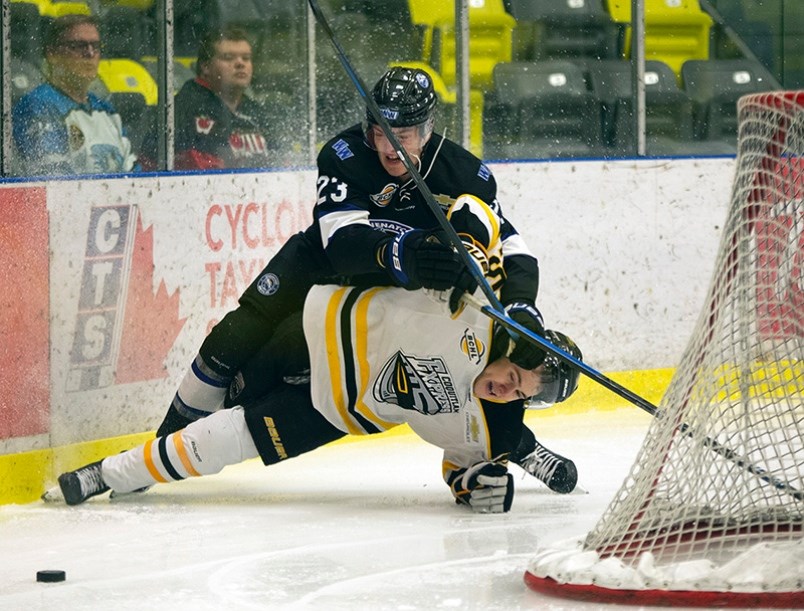A former Coquitlam Express defenceman has been awarded approximately $50,000 for an accident he said sunk his dreams of making it to the National Hockey League (NHL).
On July 29, 2012, John William Timothy Saunders was 18-years-old, driving to his former girlfriend’s relatives’ house in Kelowna, when that same ex-girlfriend, Samantha Dawn Rempel, rear-ended him in her vehicle.
Over the course of a previous trial in which Rempel admitted liability, a lawyer for Saunders argued that his client had dreams of going to a U.S. Ivy League school and one day end up in the NHL. But by closing arguments, Saunders was mainly concerned with whether he would make it on to the Vernon Vipers Junior A hockey team — the best team in the BCHL at the time — for the 2012-’13 season and get a full-ride scholarship to an NCAA Division 1 university.
In the Dec. 16 decision, Saunders — a former straight-A high-school student who came from a hockey family and had played the sport since he was five years old — sought damages for that lost opportunity, past and future wage losses, and special damages.
But Rempel said Saunders' dreams were always just that — dreams — that he failed to seek immediate treatment for the injuries he sustained in the accident and that when he did see a doctor, he didn’t follow the medical advice.
The accident occurred a few weeks before a Vernon Vipers training camp, where Saunders said he had to perform and impress in “the biggest camp of his life,” wrote the judge in the decision.
Saunders took a few days off work for a neck and whiplash injury and made a full recovery, his doctor testified. But while Saunders didn’t describe any physical pain due to the accident, he said his injuries prevented him from reading plays in hockey the way he used to.
“He felt he lost his ‘hockey IQ,’” wrote the judge in the decision. “He no longer had confidence in his abilities to react. His reflexes were slower. He said that his ability to think strategically and foresee where the puck might end up was hampered.”
Saunders transformed into a tough guy, according to court documents, testifying that coaches instructed him to “take guys’ heads off.”
Saunders failed to make the Vernon Vipers hockey team and was traded a handful of times, eventually ending up with the Coquitlam Express.
In 2014, he quit the Express — and junior hockey all together — to attend the Royal Canadian Military College in Kingston, Ont. to pursue an engineering degree while playing on the university hockey team. By spring 2018, he graduated and immediately began work with Shell Canada.
While the defendant alleged Saunders was dishonest on his application to the college when it came to his injuries, the judge disagreed, describing the plaintiff as “a stoic, hardworking, highly disciplined and ambitious young man.”
The judge did accept that Saunders avoided medical help (he only attended a walk-in medical clinic days after the accident after experiencing neck and back pain) but accepted that choice was made under the fear that his coaches would stigmatize him and not choose him to play should they find out about his injuries.
After reviewing testimony from professional hockey players, coaches and a school teacher, the judge found only 1% to 2% of players from all hockey leagues around the world make it to the NHL, and that in pursuing that goal, many good hockey players would not be offered scholarships at North American universities.
The plaintiff asked for $100,000 to $185,000 for losses related to his injuries while the defendant argued that $20,000 to $30,000 was appropriate.
The judge agreed Saunders’ ability to play competitive hockey was diminished and that his mental well-being suffered as a result. But the justice also noted Saunders kept playing hockey and that his goal of making it to the NHL was unrealistic in the first place.
In the end, Saunders was awarded $50,559 in damages.



